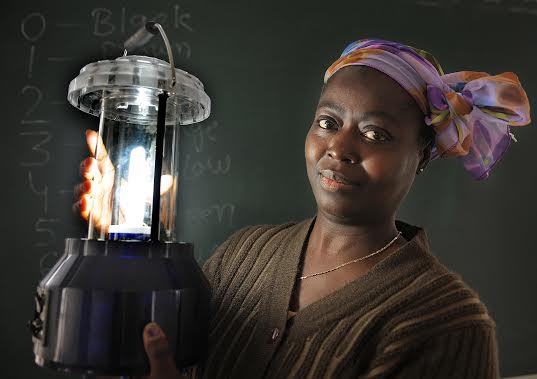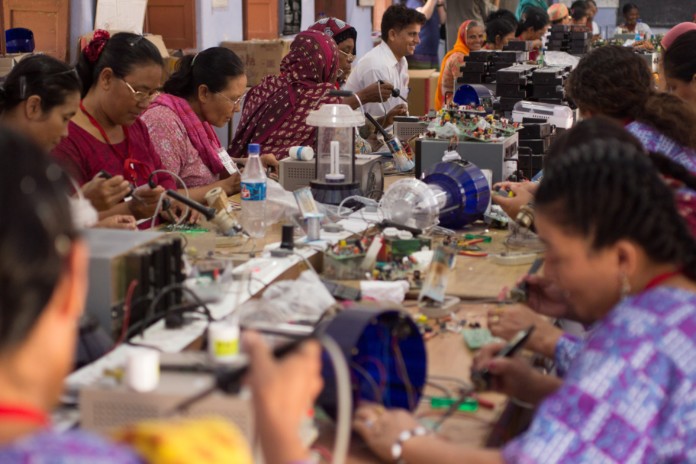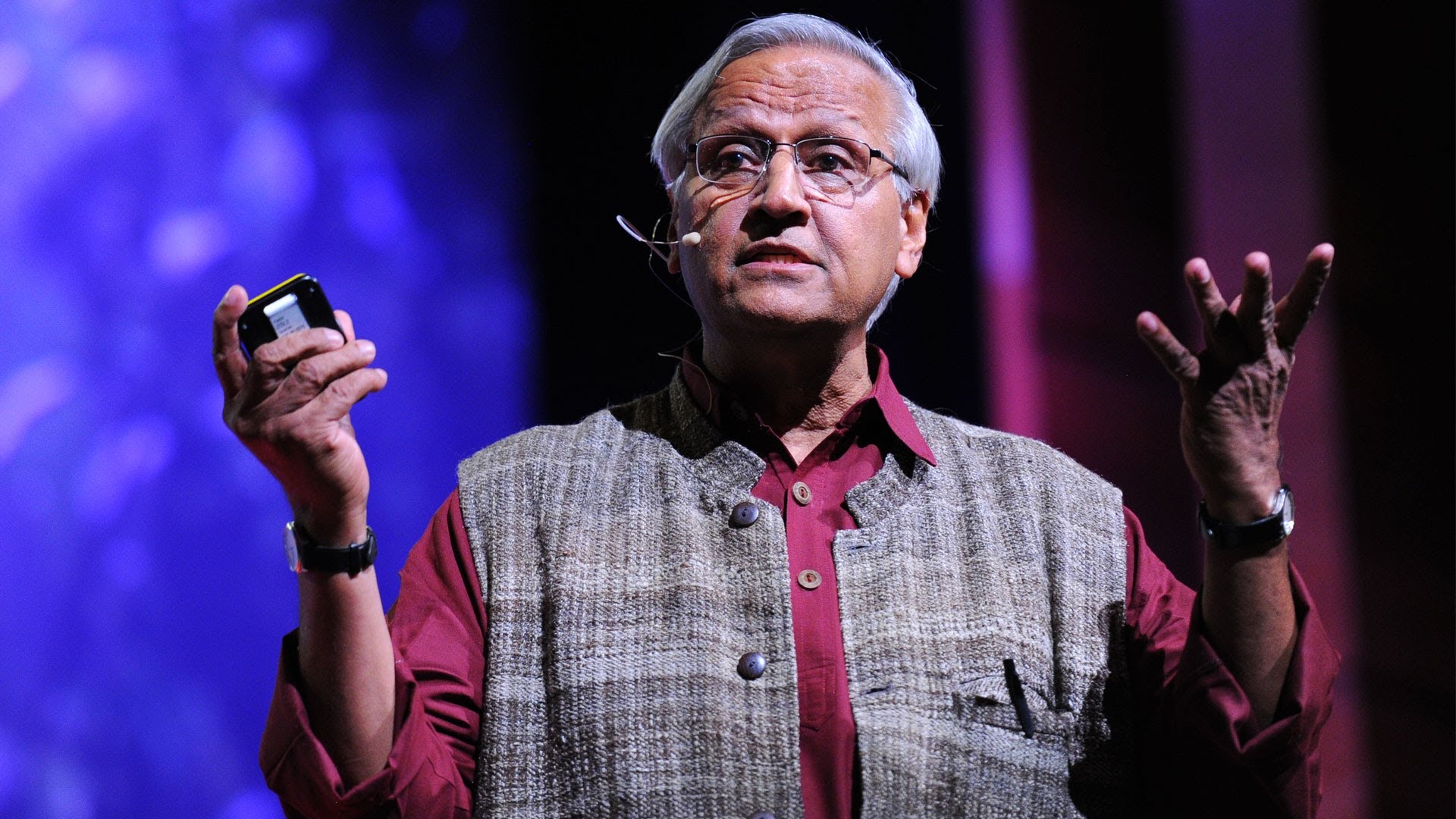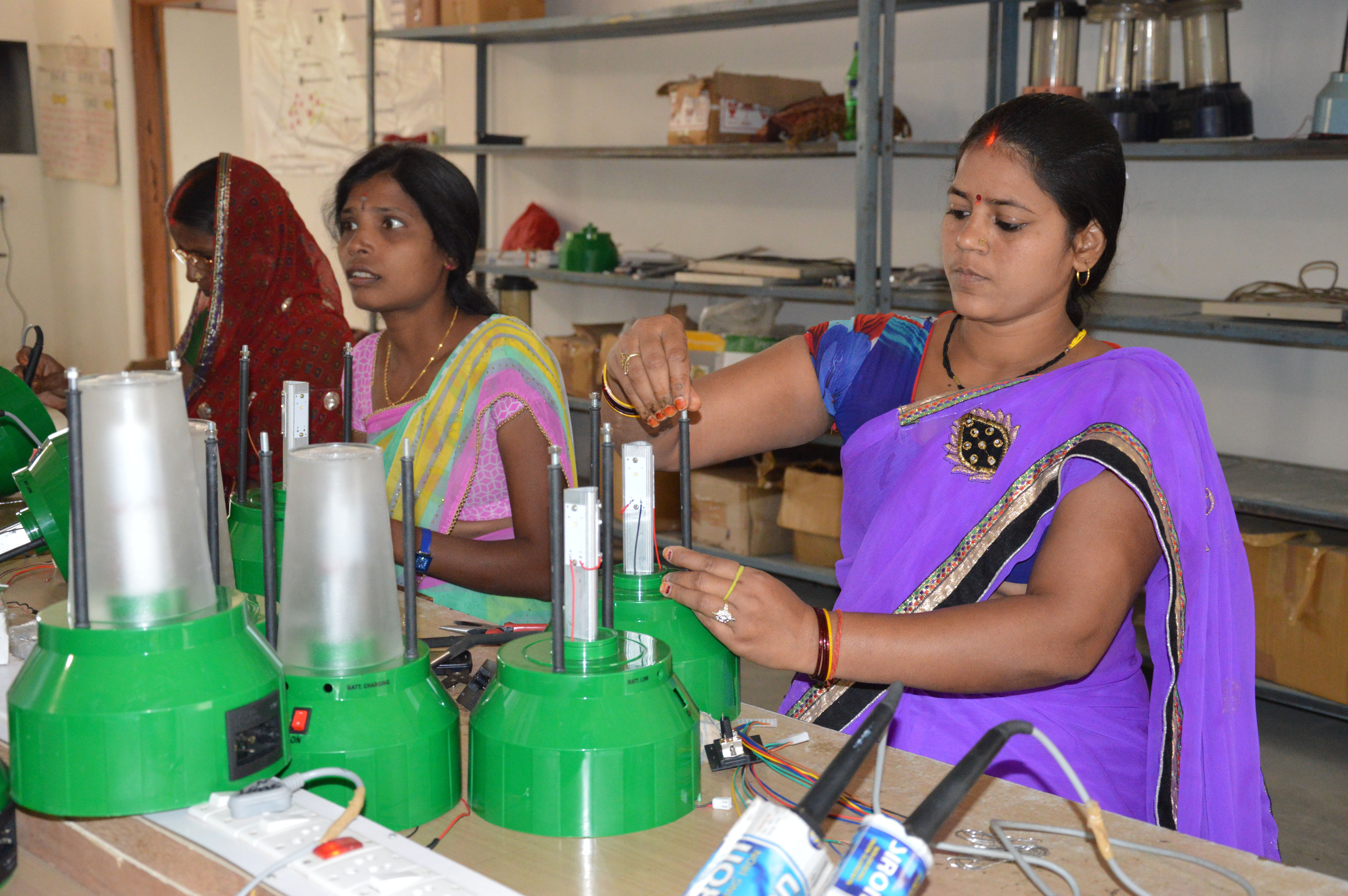The Barefoot College has trained 250 illiterate rural grandmothers in 12 States to become solar engineers. With only six month’s training they have so far solar-electrified more than 20,000 houses. The college is doing the same in a few African countries as well. The founder of Barefoot College, Bunker Roy, writes about how assumptions about poor rural folk are misplaced and the only solution for rejuvenating rural India is to go back to villages with practical training models
Mahatma Gandhi said the ultimate solution for fighting poverty in India was not mass production but production by the masses. If we are to contain massive migration in India from the rural areas to the urban; if we are to preserve the rich traditional knowledge, village skills and practical wisdom in Bharat from fast disappearing into the cities; if we are to protect and improve the quality of life of villages, then we have to apply the Gandhian Model to solar electrifying villages and think and act outside the box. We need to trust and believe in the capacity and competence of very ordinary men and women living in remote villages in Bharat to identify technical problems and offer simple technical solutions.
Forty years of experience have taught Barefoot College that formal education and qualifications are not required for the rural poor to bring sustainable energy, clean water, and sustainable livelihoods to their communities.
The college today stands as one of the very few Indian organizations that have successfully taken a leading role in setting new development paradigms by scaling a community based model to wor ld-wide proportions by adopting a globally diverse, decentralized approach to implementing large scale solutions.
For forty years it has been showing that the need to change, learn, unlearn and relearn and encompass diversity of workforce are the keys to making ongoing relevant impact.
What Bharat needs to adopt is a demystified decentralized model where poor rural people of Bharat without formal education are trained to fabricate, install, repair and maintain their own solar systems. The Gandhian Model believes solar technology must not deprive people of work in villages. Technology must be selected that will improve the quality of life immediately and tangibly. Finally, the choice of solar technology should be such that the people could maintain
it themselves.

Popular belief is that it is unwise to train the youth in Bharat. The formal educational system has destroyed them to thinking that staying in a village is demeaning. All the youth want is to acquire any skill so that they can leave their villages looking for any jobs in cities. The only people we find in villages today are the very old and the very young. So why not empower old women to be solar engineers? They are not interested in going to cities looking for a job. They are not interested in certificates that the youth are desperate to get. They will stay and serve their communities and pass their knowledge and skills to the younger generation.
It is about empowering women to assemble solar systems. Train them to be entrepreneurs to fabricate, install, repair and maintain solar systems in their own villages. Stop issuing certificates that do not have any value today and concentrate only on practical skills that will make a visible difference to the lives of people. Save millions of liters of kerosene from polluting the environment.
Instead of subsidizing the rich indirectly to produce cheaper solar panels in urban areas subsidize the solar systems directly to provide light to remote non electrified villages on condition that the poor pay for the repair and maintenance thus creating work with dignity. Demonstrate how solar electrified villages can be totally self sufficient. This will generate over 50,000 jobs in the rural areas in Bharat and prevent migration.
Practical Training Methods
For tribal women from Jharkhand, Andhra Pradesh and Bihar who have rarely left their own village, it requires undeniable courage and endurance to leave their village for the first time to travel to a far off place where everything, from surroundings, language, food and weather, to clothes, culture and habits, is different. The first month is a period of many adjustments in their lives but with time, care and support from their master trainers (who are also semi literate) they learn to adapt. “Learning by doing” is the practical philosophy adopted for training by the Barefoot College.
In the first weeks of the six months of training the emphasis is on making trainees feel at home and enabling them to familiarize themselves with different terms, tools, components and equipment used in solar technology. Practical demonstrations or ‘hands-on’ experience and regular repetition help the trainees remember terms, tools, equipment and components that most have heard and seen for the first time.
With each passing day their level of hesitancy decreases and their confidence and ‘technical dexterity’ increases. The presence of women trainees from different States creates a positive environment of cultural diversity but at the same time raises concerns over language and communication. The need for expression gives birth to a unique combination of gestures, signs and broken English cutting across all language barriers. This unique ‘language’ consisting of a combination of hands, sight and sound remains the means of training and conversation.
The challenges for Women and Girls are profound. The need to innovate and develop new definitions and access to “education” in all its forms to allow women to overcome obstacles to livelihood activity is critical and urgent.
Barefoot Model
• Barefoot College (BC) is the only community based organization (CBO) in the world that clearly makes a distinction between literacy and education.
• It is the only community based organization (CBO) in the world that targets illiterate rural mothers and grandmothers in the age group of 35 to 60 and in 6 months trains them to be solar engineers. Over 250 grandmothers have been trained from 12 States. They have solar electrified over 20,000 houses and earn around ` 2,000/- a month
• The national message of simplicity, austerity, collective decision making and compassion in action makes it a very special and unique organization to train rural grandmothers.
Most conventional development solutions that target the rural poor have failed to take hold at the village level. These solutions miss the mark in two ways: one, they rely on tools and technologies that are overwrought with complicated installation or upkeep, creating communities dependent on outside help. And two, they ignore a large group of people able to learn new skills to generate their own livelihoods and, more importantly, sustain solutions over time: they ignore the rural poor themselves. Development organizations too often neglect the knowledge, wisdom and skills of the world’s poorest, on the assumption that a lack of formal education renders them unfit to contribute meaningfully to society.
www.barefootcollege.org
Shivamma from Karnataka
“This training has taught me how to install solar equipment, but more important than that I have seen that you do not need to be educated to be able work. If you have a good brain, you can do anything. Where there is a will, there is way.”
Malamma from Karnataka
“If another batch from my village is selected for solar training, I will strongly encourage them to go and learn. I have gained a lot of confidence and I am ready to work in my village.”
Kalawati from Karnataka
“I don’t feel like going home. Everyone works here, no one is lazy. If Guruji wants me to come and work here, I will be very happy.”












